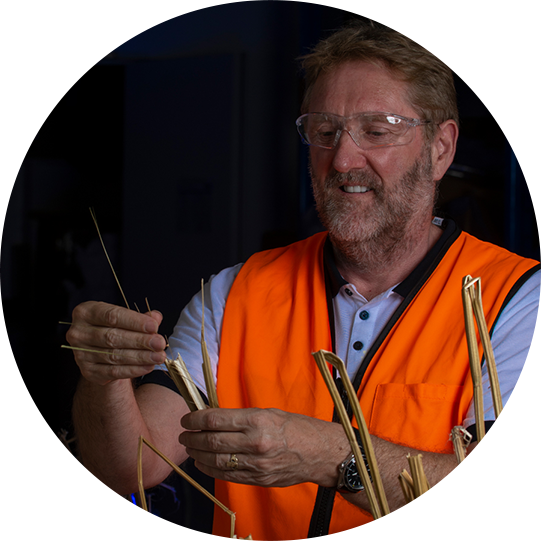
Professor Colin Barrow is leading research to recycle Australia’s rich natural organic waste into valuable bioproducts.

Professor Colin Barrow is leading research to recycle Australia’s rich natural organic waste into valuable bioproducts.
Working to revolutionise organic waste recycling is both a key mission of Professor Colin Barrow’s research and a realisation of his passion to develop bioproducts with a circular economy in mind.
Transforming waste across a range of industries into new products, Prof. Barrow is working towards advanced manufacturing solutions based on ‘greener’ principles.
‘My early training as a natural products chemist in the discovery of new drugs from terrestrial and marine plants led me to see the value in natural materials,’ he says.
‘Food, agricultural and marine waste is rich in organics that could be used for new feed, nutrition, cosmetic, agricultural and medical products. Much of this material is currently sent to landfill where it is not only wasted, but is a major contributor to Australia’s methane emissions.
‘Moving to a sustainable future requires new advanced green manufacturing practices that utilise waste as a valuable input resource rather than simply discarding it.’
Prof. Barrow joined Deakin’s School of Life and Environmental Sciences in 2009. He went on to become an Alfred Deakin Professor and the University’s inaugural Chair of Biotechnology, leading the former Centre for Chemistry and Biotechnology (CCB). Prior to that Prof. Barrow held research and development roles at the University of Melbourne and in the US pharmaceuticals and Canadian nutrition industries, having completed a PhD in marine natural products chemistry at the University of Canterbury and an MBA at Penn State.
Over the past 10 years, Prof. Barrow has led research primarily in areas of food chemistry, biotechnology and nanomaterials. Notably, he has developed methods for producing omega-3 concentrates; stabilised omega-3 delivery systems; conceived fermentation methods for omega-3 production; and devised techniques for extracting and isolating new ingredients from agricultural and marine biomass. He serves on the Therapeutic Goods Administration (TGA) Advisory Committee on Complementary Medicines, where he provides expert advice to the Australian Government Department of Health on the safety, efficacy and manufacturing quality of complementary medicines.
Prof. Barrow heads the multi-million-dollar Innovative Bioprocessing Technologies research program within the Marine and Bioproducts Cooperative Research Centre (MB-CRC) and is Deputy Director of the ARC-funded Industry Transformation Training Centre (IITC) for Green Chemistry in Manufacturing. His innovative work in organic recycling also has been recognised by the State Government: he was recently appointed to lead the new Deakin BioFactory at the University’s Waurn Ponds campus – part of a $16.4 million Circular Economy Accelerator-Organics (CEA-O) project in partnership with the Victorian Government, 20 industry partners, Monash University and RMIT University. Part of the Geelong Future Economy Precinct, the BioFactory links the existing IITC for Green Chemistry and Manufacturing, the IITC for Transforming Biosolids and the MB-CRC Bioprocessing Technologies program, building infrastructure to encourage investment in Victorian advanced manufacturing. The initiative will pilot and test new processes to develop products from food and agricultural waste and marine biomass.
Pushing the limits of the marine bioindustry is one of Prof. Barrow’s specialities. ‘It’s thrilling that my research allows me to take under-utilised marine materials, such as farmed seaweed, micro-algae or seafood waste, to produce new products and materials,’ he says. ‘The advanced manufacturing technology we are developing can be applied to achieve similar benefits in other industries, such as agriculture, food and medicine.’
Transforming fish skin into collagen for wound healing or cosmetics, and harvesting omega-3 from micro-algae for food supplements, fish food and pharmaceutical products are just some of the expected applications of Prof. Barrow’s research. His work with the MB-CRC will help to seed new advanced manufacturing industries and fast-track Australia’s next-generation marine bioindustry to meet growing global demand for certified, safe, sustainable and traceable bioproducts.
‘There are tremendous organic bioprocessing opportunities in Australia. The $1.3 billion aquaculture sector produces various by-products that can be converted to aquafeed (for farmed fish) or human nutritional products. It is really exciting to be able to lead novel bioproducts research that will support generations to combat the effects of climate change.’
Prof. Barrow’s work within Deakin’s Circular Economy Initiative unites diverse industry partners across the value chain, from biomass producers to equipment and product developers in the animal feed, nutritional supplement, rendering, agricultural and medical biomaterials sectors, under a common goal to utilise all input materials to produce innovative products. Beyond Australia, he works with international researchers and industry partners through funded projects with Plant & Food New Zealand, and the TERI-Deakin Nanobiotechnology Institute in India, among others.
‘There are always opportunities for industry leaders to collaborate with university researchers, and for manufacturing-based industries to boost their investment in regional Victoria to create high quality manufacturing jobs, extend their product lines and benefit the environment.’
For more information about any of our researchers please contact Deakin Research.